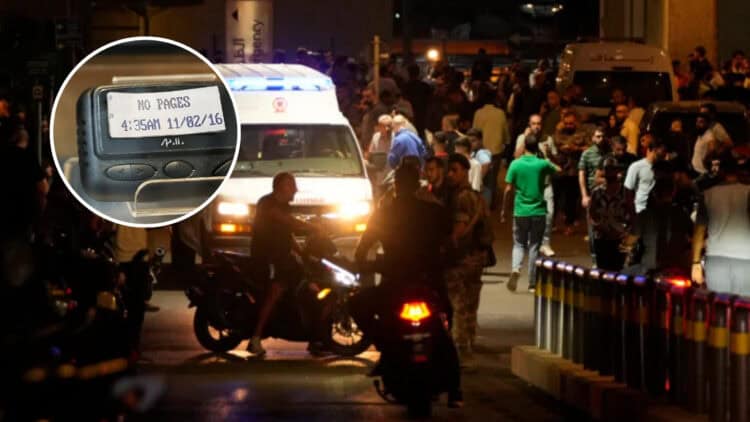Israel has been accused of orchestrating a devastating attack on Hezbollah members through the coordinated detonation of thousands of pagers, killing at least nine people and injuring nearly 3,000 others across Lebanon. The attack, which targeted Hezbollah operatives, has been widely condemned and has escalated tensions in the already volatile region.
According to reports, the explosions occurred when pagers, believed to have been tampered with at the production level, exploded simultaneously across the country. Experts believe that the devices, used by Hezbollah members for communication, were rigged with small plastic explosives that could be triggered remotely. Lebanese authorities, along with international observers, are now pointing the finger at Israel’s Mossad and the Israel Defense Forces (IDF) for the attack.
A Covert Operation in the Making
The New York Times has reported that Israel’s Mossad spy agency and the IDF jointly carried out the operation. The attack is said to have been months in the making, with the explosives hidden inside the pagers during their production. The pagers were part of a large shipment imported into Lebanon earlier this year under a new license from Gold Apollo, a Taiwanese company. The devices, which were manufactured in Europe, were then distributed among Hezbollah members for internal communication.
Security sources in Lebanon have confirmed that the operation involved planting explosives as small as three grams within the devices. These explosives, hidden alongside the lithium-ion batteries, were designed to detonate when triggered remotely via a call or page.
Charles Lister, an expert from the Middle East Institute, explained, “This was more than lithium batteries being forced into override. A small plastic explosive was almost certainly concealed alongside the battery, for remote detonation via a call or page. Mossad infiltrated the supply chain.”
Paul Christensen, a battery safety expert at Newcastle University, voiced skepticism about the likelihood of such an attack being caused by malfunctioning batteries alone. “What we’re talking about is a relatively small battery bursting into flames. We’re not talking of a fatal explosion here. My intuition is telling me that it’s highly unlikely,” he said, adding credence to the theory that explosives had been deliberately concealed inside the devices.
Casualties and Destruction
Lebanon’s Health Minister, Firass Abiad, has confirmed the devastating toll of the attacks. “About 2,750 people were injured … more than 200 of them critically,” he said in a statement. Among the victims was a 10-year-old girl, whose death has further shocked the country.
Harrowing footage from the aftermath of the attack has been circulating on social media, showing victims collapsing in the streets as pagers exploded in their pockets over a 30-minute period on Tuesday. The explosions, which began in Hezbollah-controlled areas, soon spread across the country, catching many by surprise.
A Hezbollah spokesperson called the attack the “biggest security breach yet” and vowed retaliation. The spokesperson, speaking on condition of anonymity, described how the pagers initially heated up before exploding, causing severe injuries and, in some cases, instant death.
In addition to the fatalities and injuries, the explosions have left a swathe of destruction across Lebanon, with many buildings and vehicles damaged by the blasts. The full extent of the damage is still being assessed.
Hezbollah Vows Retaliation
Hezbollah’s leader, Hassan Nasrallah, has condemned the attack and blamed Israel for the deaths. Nasrallah, who has long warned his members against using mobile phones due to concerns about Israeli surveillance, claimed that Israel had found a new way to infiltrate Hezbollah’s communications network.
“This is a new Israeli aggression against Lebanon,” said Ali Ammar, a prominent Hezbollah politician, whose son Mahdi was among those killed in the attack. “The resistance will retaliate in a suitable way at the suitable time.”
Hezbollah has vowed to respond, raising fears of further violence in a region already wracked by conflict. For months, Hezbollah and Israeli forces have been engaged in near-daily skirmishes, particularly along the Israeli-Lebanese border. These clashes, fueled by the ongoing conflict between Israel and Hamas in Gaza, have resulted in hundreds of deaths on both sides, displacing tens of thousands of civilians.
International Condemnation
The international community has swiftly responded to the incident, with the United Nations calling the attack “deplorable.” Jeanine Hennis-Plasschaert, the UN Special Coordinator for Lebanon, urged both sides to exercise restraint. “In accordance with international humanitarian law, civilians are not a target and must be protected at all times,” her statement read. “Even one civilian casualty is one too many.”
The attack has sparked outrage across Lebanon, with many citizens accusing Israel of committing a war crime. Iranian officials have also weighed in, expressing their solidarity with Hezbollah. Iran, a close ally of the group, has long supported Hezbollah’s military activities in Lebanon and across the region. In a statement, Iran’s ambassador to Lebanon, who was reportedly injured in the blasts, called the attack a “cowardly act” and vowed continued support for Hezbollah’s resistance efforts.
The Palestinian militant group Hamas also expressed solidarity with Hezbollah. In a statement, the group said, “We appreciate the struggle and sacrifices of our brothers in Hezbollah, and their insistence on continuing to support and back our Palestinian people in Gaza.”
Israel Remains Silent
While the accusations against Israel have intensified, the Israeli government has so far remained silent on the matter. The Israeli military and Mossad have declined to comment, maintaining a long-standing policy of neither confirming nor denying involvement in covert operations.
The United States has also denied any involvement in the attack. State Department spokesman Matthew Miller stated, “The US was not aware of this incident in advance. And at this point, we’re gathering information.”
Escalating Tensions
This latest incident marks a dangerous escalation in the already strained relationship between Lebanon and Israel. With Hezbollah vowing retaliation and Israel maintaining its silence, the situation remains volatile. Observers fear that further violence could erupt in the coming days, potentially drawing in other actors from across the region.
You may also like: Former PM slams Rwanda deportation scheme as ‘un-British’ in scathing attack on Tory policy







